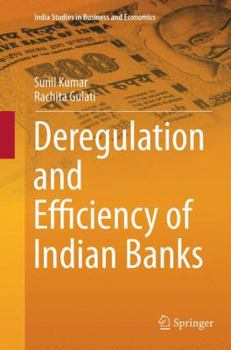Deregulation and Efficiency of Indian Banks
Select Format
Select Condition 
Book Overview
The goal of this book is to assess the efficacy of India's financial deregulation programme by analyzing the developments in cost efficiency and total factor productivity growth across different ownership types and size classes in the banking sector over the post-deregulation years. The work also gauges the impact of inclusion or exclusion of a proxy for non-traditional activities on the cost efficiency estimates for Indian banks, and ranking of distinct ownership groups. It also investigates the hitherto neglected aspect of the nature of returns-to-scale in the Indian banking industry. In addition, the work explores the key bank-specific factors that explain the inter-bank variations in efficiency and productivity growth. Overall, the empirical results of this work allow us to ascertain whether the gradualist approach to reforming the banking system in a developing economy like India has yielded the most significant policy goal of achieving efficiency and productivity gains. The authors believe that the findings of this book could give useful policy directions and suggestions to other developing economies that have embarked on a deregulation path or are contemplating doing so.
Format:Paperback
Language:English
ISBN:8132228995
ISBN13:9788132228998
Release Date:August 2016
Publisher:Springer
Length:323 Pages
Weight:1.07 lbs.
Dimensions:0.7" x 6.1" x 9.2"
Customer Reviews
0 rating





